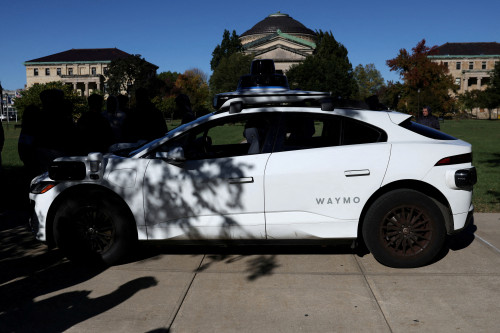By Sheila Dang
(Reuters) -Snap beat Wall Street’s expectations for quarterly revenue and user growth on Thursday, as improvements to its advertising system delivered results faster than anticipated.
Shares of Snap spiked 25% to $14.32 in after-market trading.
The owner of photo messaging app Snapchat has been working over the past year to improve how it targets ads to users and simplify the way people interact with the ads. The company has historically struggled to compete against much larger rivals like Facebook owner Meta Platforms for digital ad revenue.
Revenue during the first quarter ended March 31 was $1.2 billion, up 21% from the prior-year quarter and beating the analyst consensus estimate, which was $1.12 billion according to LSEG data.
In a letter to shareholders, Snap said its business was improving faster than it expected due to the upgrades of its ad system and higher demand for features that help brands drive sales or website clicks.
“Years of diligent work are beginning to pay off for Snap’s ad business,” said Emarketer senior analyst Max Willens, adding that the quarterly report “suggests that Snap may have a strong year ahead.”
Snap forecast a rosy picture for the second quarter, saying it expects revenue between $1.23 billion and $1.26 billion. The guidance beat analyst expectations of $1.22 billion.
Daily active users of Snapchat grew to 422 million during the first quarter, beating analyst expectations of 419.6 million.
On Tuesday, the U.S. Senate passed a bill that gives Chinese tech company ByteDance up to one year to divest its wildly popular video app TikTok, or else the app will be banned in the U.S. Snap introduced its TikTok-like feature called Spotlight in 2020, and ad buyers have told Reuters that Snap will be a beneficiary of some marketing budgets if TikTok is no longer available.
Reuters reported on Thursday that ByteDance prefers to shut down TikTok if it exhausts its legal options for fighting the legislation.
Snap said it expects to grow to 431 million users in the second quarter.
The Santa Monica, California-based company added that it expects its quarterly infrastructure cost per user to be between 83 cents 85 cents for the rest of this year.
(Reporting by Sheila Dang in Austin, TexasAdditional reporting by Jaspreet Singh in BengaluruEditing by Matthew Lewis)



